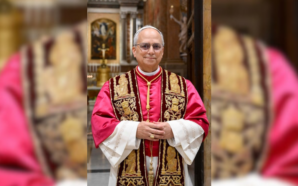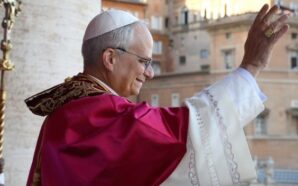Most Reverend Vincent Long Van Nguyen OFM Conv DD STL, Bishop of Parramatta
Homily for Easter Sunday
Easter empowers us do new things for a new heaven and a new earth
My dear people,
It is with profound gratitude and joy that we have gathered to celebrate the Resurrection of our Lord. Easter empowers us to be witnesses of the Gospel, pilgrims of hope and partners with the living God in the transformation of the world he so loves. Easter frames our endeavours with divine potentiality. We are not left on our own amidst random, inconsequential and capricious interactions of the universe. The paschal rhythm of suffering, death and resurrection resets the whole cosmic cycle. In the risen Christ, love springs eternal, light is inextinguishable, and the divine energy brings all things to unity. There is direction and purpose in the movement of history, space, time and evolution with Christ being the Alpha and Omega. With him, we are destined to bring the full realisation of the reign of God.
Pope Francis has named this year as a Jubilee Year. He has invited us to a time to embrace hope, deepen our faith and draw closer to God. We are to become “Pilgrims of Hope”, accompanying one another on a journey towards peace, reconciliation and harmony. At its heart, Jubilee is a radical reset: a return to the covenant community where all -including orphans, widows and strangers- are accorded the dignity of God’s children. Rooted in the Jewish Sabbath tradition and echoed in the Christian Eucharist, it invites us to work towards the liberation of all.
Easter motivates us in this noble enterprise. With the risen Christ, we are to restore relationships, repair injustices, give equity to the underclass, relieve the indebted and reimagine community in alignment with God’s vision of solidarity and harmony. It gives us the courage to keep reaching, keep working and keep fighting for a better future, a better society, a better world and a better church.
The Gospel today speaks of a liminal time of solitude, concealment and ambiguity. Mary of Magdala and the other disciples went to the tomb while it was still twilight. It was there in the silence and stillness of the dark that they attended to their grief and longing for Jesus. Liminal time is a time for deepening of commitment, of grounding our values and discerning what needs to die and what needs to rise.
Liminal time is also a time to grieve. Like Peter who had to unlearn his default mode of superiority and power, we must grieve for being an experience of exclusion instead of an encounter of radical love, inclusiveness and solidarity. We must grieve for the way we have allowed the preoccupation with the status quo, wealth, privilege and security to undermine the mission of the humble and poor servant Church.
Likewise, we must grieve for the millions of refugees who are displaced because of oppression, violence and conflict; for those struggling in our own increasingly un-egalitarian society; for the plight of our indigenous that is far from our founding dream of Australia fair; for the plundering and destruction of our Mother Earth. We must grieve for our complicity in perpetuating systemic injustices against the weak, the marginal and the minority among us. During this time, let us show our solidarity with the people of Ukraine, Myanmar, Sudan and Gaza where death, starvation, cruelty and agony are the daily occurrence.
It is with this prism of God’s deep pathos for his suffering people that we can influence the political agenda of our nation as we exercise the duty of electing the next government. Inspired by the biblical vision of a viable society for all and Jesus’ model of privileging the downtrodden, we can work towards an economy and a social structure that prioritizes the care of all people and the care of the environment.
The Easter story does not end with Mary in grief. It tells us of her encounter with the risen Lord who calls out her name and sends her out on a mission of proclaiming to others the Good News of the resurrection. We too must hear Christ’s summons to build a new future against the background of entrenched hopelessness. What is more, we have become a new type of person who can do new things for a new heaven and a new earth.
To be an Easter people means to do the work of Easter. This was what Mary McKillop and other Catholic pioneers did during the time of colonial Australia. They pioneered a radical alternative system of equity, inclusion, solidarity and preferential option for the poor. A collective witness to the Gospel of hospitality, generosity and compassion rose up against the background of a trickle-down, sectarian and merit-based society. Now, it is our turn to put new flesh on the marrow of the Gospel. We are challenged to be the critical yeast for critical times ahead by modelling a new way of being together for the sake of the poor and God’s creation.
Dear brothers and sisters,
With the joy and confidence of Easter, let us bear witness to the Kingdom vision of Jesus. Let us have the courage of the disciples in venturing to the new frontiers of solidarity, creating social bonds and fostering common purpose, thus becoming ourselves the leaven of the Gospel. Let us model a different way of being together – a society that is grounded in justice, animated by mercy, and sustained by hope. Let us be truly Easter women and men bringing to life the Good News of Christ.








